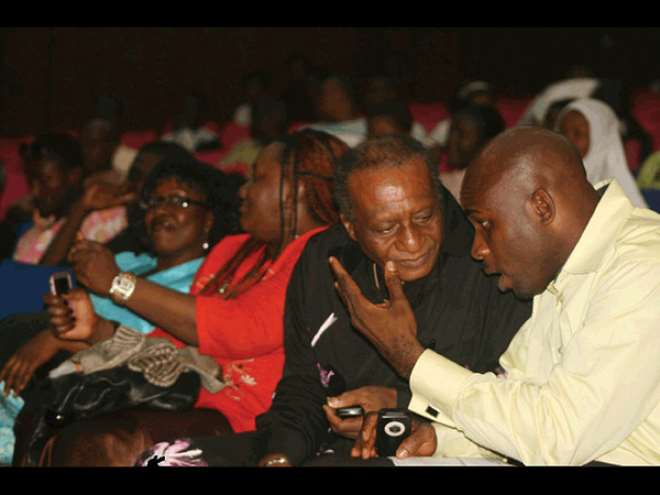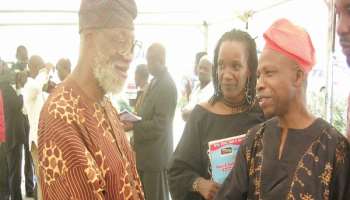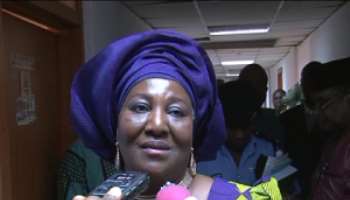Film as a connecting medium
Producer Parminder Vir is an Indian in love with Nollywood. Vir not only rates Nollywood highly, she also believes there is a relationship between Nigeria's popular indigenous movie industry and Bollywood. "The film industry and film as a culture is a meeting point. It is the only medium other than music that enables people to meet across cultures, national boundaries and languages. Film is an emotional medium and if we are telling universal stories, it doesn't matter where you are. Absolutely, there is a meeting point between Hollywood, Bollywood, Nollywood and any other film industry in the world. [In 2008], I came and we talked about the European film industry and what Nollywood can teach them or learn from them; about how we in Europe have a structured film industry. So, yes of course, there is a meeting point."
Strategic project
As part of her resolve to ensure cooperation between both industries, the expert in international film finance, co-productions and film distribution was in Nigeria last December for the ION International Film Festival. She was the programme consultant for the 'Connecting Bollywood and Nollywood' session which involved Indian and Nigerian filmmakers during the festival. The producer of award winning 'Single Voices' says of the initiative. "I think the project is really strategic. It's not a single film project that would happen depending on the quality or structure of the project. I am much more interested in the strategic relationships and alliances because the film industry is a business, it's not a lifestyle. And ultimately, the film industry contributes phenomenally to the economy and culture of the country.
"Here in Nigeria, I think there is a lot that Nollywood can learn on how the partnership between the Indian government, the Indian film industry and the private sector was forged. They were able to attract foreign direct investment, direct investors from within the country and government support for the industry. That is exactly the position that Nollywood needs to be; where it can get the government, the industry itself, producers and distributors, exhibitors and the private sector to come together to develop a strategy which serves the film industry as an important sector of the economy."
Hit or miss medium
The 2002 recipient of the Order of the British Empire (OBE) for her contributions to TV and film in the UK also recommends 'pre sale' to Nigerian producers as a way of getting money to make films. "Distribution in the European and Indian model, what you have is presale. You go to the distributor and say I want to make this film; this is the subject and the audience it is targeted at. This is how much I think we will make once the film is made and it is sold as a VCD or whatever revenue stream you want to explore. So, pre sale means you have pre-sold your film and someone believes in your story to be able to advance you money against what they think they will make. And if they make more than what they expect the film would make, they would benefit from the success of the film. If it doesn't, they would have to deal with the consequences from the loss of the film as well."
Though not a bad suggestion, I cite examples of Nigerian producers who pre-sold movies which later became very successful but got nothing from the distributor. What happens to such producers in such situations?
"People not honouring contracts, that happens all the time because film is a hit or miss medium. You have hits and misses but neither the producer who took his product to the distributor nor the distributor knew the film could perform beyond what they thought it could. If it does, for me, the distributor took the risk by pre-buying the film. But then, I would like to think that the distributor is in this industry for a long time. So, the distributor should be able to go back to the producer and say 'hey, what's your next film? Let me sign you up for your next three films. This is how much I can bring to the table.' And the producer should get smart and say ok, 'I would also want to share in the next profit.' So, it's important to locate the film beyond the box office to say I want to also negotiate a net profit corridor. The problem is that producers always need money to make film, so they don't think that this film could be a hit and beyond this, it could have a long term because people could still go on either renting or purchasing through different medium."
Distribution is the future
Unlike in Nigeria, Western filmmakers have shifted focus from production to distribution in a bid to make more money. The chief executive of PVL Media Consultant suggests the same for players in Nollywood. "I think it would be a wrong strategy to continue to pour money into production without having the means of monetizing that production. You also need to diversify your revenue stream. At the moment, it is only retail that is dominant here but you have to diversify your revenue streams. You have theatrical, TV, retail which is your normal DVD and the international market as well. Within television, you've got pay TV.
" I also think you have to make a distinction now between those who really make television and those who aspire to be filmmakers and cinematic storytellers. I think there is a big difference between the cinema as a medium and film as a medium. I would also think that in order for you to exploit the revenue from theatrical ticket sales, you've got to put in place digital exhibitions because that's the way the world is going. The reason why we in the UK are focusing on distribution is because digital distribution, for us, is the future. So, we need to look at how do we monetise our film? How do we monetise it online? How do we monetise the different digital platforms?"
Born in India but moving to the UK at age 10, Vir crossed into film from being a Television documentary producer. She went into TV and film because "I wanted to tell stories and I wanted to give a voice to the voiceless. In the UK, I wanted to basically have storytellers that came from the so called ethnic minority communities." She describes her over 20 years experience in film and television production, media finance and business development in emerging markets as a "challenge" but adds "I think it's such a privilege and an honour to work in film and television industry."
By Akintayo Abodunrin/www.nollywoodgists.com
Latest News
-
 "If You're For Me, I Am For You" - Cubana Chief P
"If You're For Me, I Am For You" - Cubana Chief P -
 "3 Days To Go" - Femi Adebayo Urges Fans To Get S
"3 Days To Go" - Femi Adebayo Urges Fans To Get S -
 "Stop Asking Me Questions About Speed Darlington"
"Stop Asking Me Questions About Speed Darlington" -
 "Benue Is The Most Underdeveloped State I've Ever
"Benue Is The Most Underdeveloped State I've Ever -
 Stan Alieke Urges Young Professionals To Take Lin
Stan Alieke Urges Young Professionals To Take Lin -
 Chizzy Alichi Teases Fans With Baby Reveal, Promot
Chizzy Alichi Teases Fans With Baby Reveal, Promot -
 "I'm Not Wearing Makeup From July 4th Till Decemb
"I'm Not Wearing Makeup From July 4th Till Decemb -
 "Stop The Challenge Of Mocking Kids With Down Syn
"Stop The Challenge Of Mocking Kids With Down Syn -
 Regina Daniels Celebrates Sons As They Mark Birthd
Regina Daniels Celebrates Sons As They Mark Birthd -
 Speed Darlington Threatens To Sue NAPTIP For Defam
Speed Darlington Threatens To Sue NAPTIP For Defam














